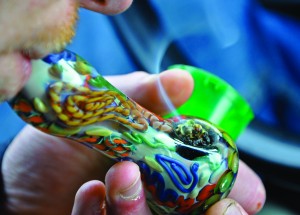Katie Schultz
News Editor
As the state legislature tries to clear up the confusion that medical marijuana has created in Colorado, the ripple effect can be felt here at Mesa State College. The administration has already begun to sort through some of the challenges medical marijuana has created, even if it doesn’t have all the answers.
The administration, for now, has decided to continue with the existing marijuana policy. It is prohibited on campus, even if a student has their registry card.
“We want to dispel the myth that having (the registry card) allows you to have marijuana on campus,” said John Marshall, vice-president for student services.
According to Marshall, MSC cannot allow students with registry cards to use medical marijuana on campus. If a student does have a registry card, he or she can either find a way to smoke it off campus that is consistent with the laws and if arrangements can’t be made, they will be relieved from their contract to live on campus. It will be handled on a case-by-case basis.
“Alcohol is legal and it’s not permitted on campus,” said Tim Foster, president of the college. “We are pursuing the same path for medical mProxy-Connection: keep-alive
Cache-Control: max-age=0
ijuana.”
For now, according to Marshall, there hasn’t been any issue with medical marijuana use on campus. “We are going to take it as itProxy-Connection: keep-alive
Cache-Control: max-age=0
omes,” Marshall said.
With a strong stand against the use of medical marijuana on campus, the lines are still blurry for student athletes who have their registry card.
“It’s a great question; we don’t have (a policy) yet,” said Athletic Director, Butch Miller. “We would have to determine if an injury is that bad that a student needs that, could the student really be able to perform as a collegiate athlete.”
According to Miller, the athletic department will look into how other schools are dealing with the issue as well as what policies the National Collegiate Athletic Association (NCAA) puts forth, but as of now they don’tProxy-Connection: keep-alive
Cache-Control: max-age=0
ave any athletes with registry cards that they know of.
The NCAA conducts drug tests every season, where students from each team are randomly selected to be tested. In a video about banned drugs, the chair of the NCAA competitive safeguards committee, Jerry Koloskie, said, “Banned substances should not be allowed unless there is sufficient evidence of medical need.” However, Koloskie goes on to say, “There is no medical exception for the use of street drugs.”
Under the NCAA dProxy-Connection: keep-alive
Cache-Control: max-age=0
inition, marijuana is still classified as a street drug, making the policy for the issue still unclear.
“If it’s coming from a doctor, it’s not our call,” Miller said.
There are only a handful of doctors that prescribe medical marijuana here on the Western Slope, and they are very hard to get a hold of, according to Travis Chambers, owner of God’s Gift.
Michael Pramenko, M.D. at Primary Care Partners, who does not prescribe marijuana, backs the legislation that would require a doctor and patient to have a standing relationship before being able to prescribe medical marijuana.
“Where do you draw the line before you begin abusing the system?” Pramenko said. “There are physicians who abuse this just to make a buck.”
According to Pramenko, there are only a few rare cases where medical marijuana should be prescribed, but there are usually other drugs that could be used. On the other hand there are fewer side effects with short term use of medical marijuana in comparison to other drugs that are prescribed. If a patient does begin to use it chronically there are some noticeable behavioral and motivational changes.
“I have decided to stay out of it,” Pramenko said. “Once you start prescribing it, you get labeled as the doctor who prescribes (marijuana).”
Pramenko also pointed out that right now it’s hard to determine where the whole issue will end up legally.
See the 2009-2010 Student and Academic Polices Guide for more information on MSC drug and alcohol policy, and check out next week’s issue of the Criterion for the third and final installment of Medical Marijuana: From Washington D.C. to MSC where we take a look at what students have to say about the issue as well as how students who have their registry cards deal with the issue daily.

Recent Comments